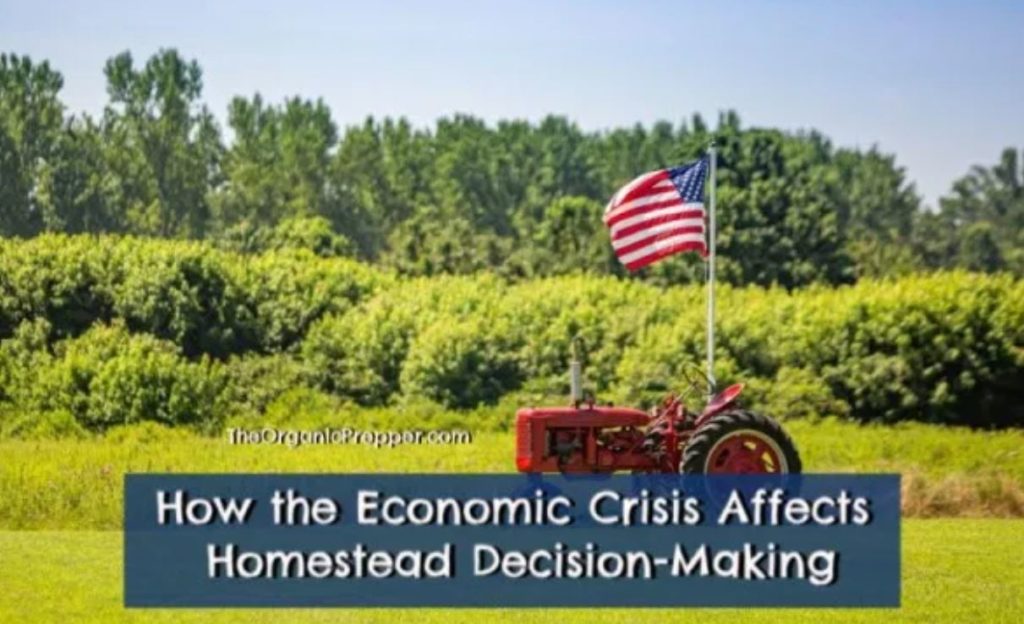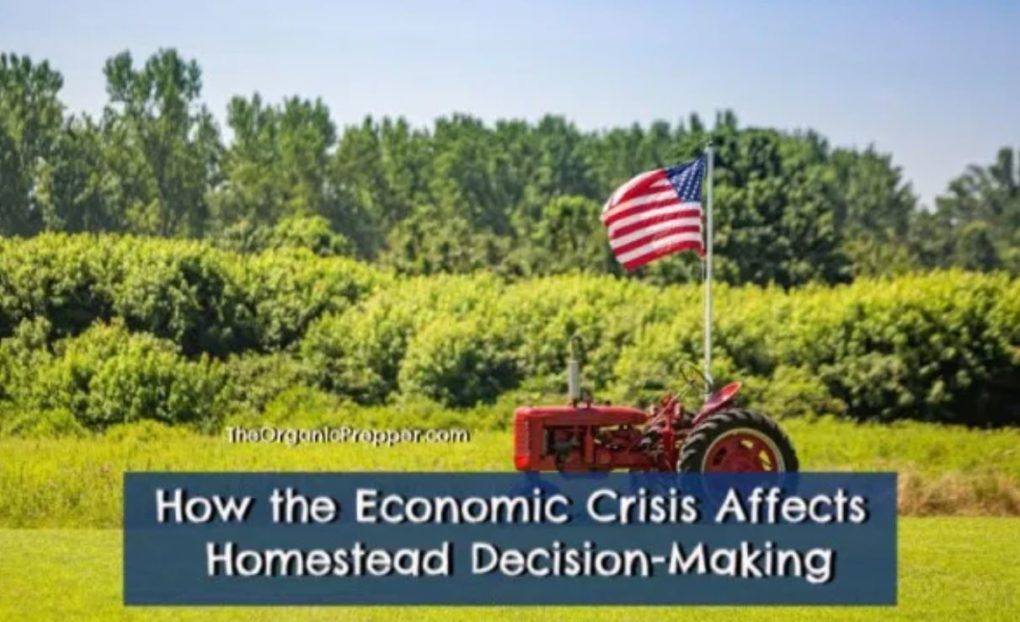How the Economic Crisis Affects Homestead Decision-Making
 By Kara Stiff
By Kara Stiff
While the United States has halted much of its usual business due to COVID-19, my day-to-day life is pretty much unchanged. We never did eat out often or go to big public events, because we’ve deliberately crafted a home-based life. Oh, I have a new signal booster so my husband can work more easily from home, and there are no more meetups with friends.
But other than that I’m just doing the regular: watering the seedlings, homeschooling the kids and checking on my goose, who is sitting on 21 eggs. Spring is a very exciting time of year, just like always.
Decision-making changes in a crisis
A couple of weeks ago as the goose was laying that ridiculous pile of eggs, I was thinking about spring Chickenstock, our local livestock festival. It’s outdoors, so I thought it might go ahead even if other restrictions were put in place. If she hatched most of those eggs and I managed to sell most of the goslings (keeping some for us of course), would the geese break even financially in their first year? What an exciting prospect!
Widget not in any sidebars
Now, Chickenstock has been canceled. Sure, I could sell goslings over Craigslist and maintain social distancing rules. I might even make more money that way. But instead, I’m thinking about how much feed 21 goslings will eat, and whether they could provide a year’s worth of cooking fat. Actually, that’s a pretty exciting prospect, too.
It’s hard to tell right now how much of a crisis COVID-19 really is because it’s moving slower than some of the things many of us have planned for. Obviously it’s already a health crisis. And it’s just become an education crisis, as schools and colleges close.
In some places, it’s been an empty-shelves crisis for days or weeks, and a supply chain crisis in the making, and maybe a public safety crisis soon. But it’s hard to predict when those particular impacts will hit any particular location. Here in sleepy rural North Carolina, nothing bad has happened yet.
It makes sense to plan for extreme and fast-moving events because then you’re ready for anything up to and including an instant shutdown resulting from a storm or other disaster. But thinking in immediate-danger mode makes it harder to make decisions when events are developing over the course of hours rather than weeks. It leaves me wondering, is this the moment for this particular supply or preparation? Or is the right moment next week, or next month?
Prioritizing the basics
I don’t know when the perfect moment is. All I know is my behavior is changing, all on its own. I find myself out in the yard picking wild greens for lunch, even when I’m running late and the kids are starting to whine, even when it’s raining so hard I ordinarily wouldn’t bother. Putting something fresh and highly nutritious on the plate is always important to me, but now it has become getting-wet, putting-up-with-whining important. That’s a whole other level.
Also, the usual cost/benefit guidelines are shifting. Instead of dithering on installing the new water catchment, considering waiting until next month for time and cost reasons, I put other things on hold and pushed hard to get it done. That’s a definite shift in mindset.
In normal times, choices on a homestead are very finely calibrated. We must seek a balance between all the experiments we would love to run on the one hand, and on the other, the limited amount of money, time and energy we have. Adding too many new things at once causes established projects to fail, projects into which much time and devotion have already been put.
My friend Itsy, a small-scale homesteader in central North Carolina, doesn’t usually do much gardening. She focuses on keeping her livestock healthy and getting her kids to all their activities. She was planning on doing only a few tomatoes and peppers this year, but then her extended family suffered food insecurity related to coronavirus disruption. She changed her mind about gardening and is now planting radishes, carro
ts, potatoes, sweet potatoes and more.
She put it to me this way: “Since my kids’ sports are canceled, now I have time. I’m not the world’s best gardener, but by God, I can grow a tomato! Then I can leave more of whatever’s on the shelf for other people.”
She’s not the only one feeling the gardening itch. Taylor is a college professor, mom and container gardener. Her family has raspberries, peaches and ten hives of bees on their tiny lot, but after coronavirus hit our area they decided to till up a portion of the lawn for vegetables. She has recruited other newbie gardeners from her university to start gardens, and built a local online forum to share information.
She said, “It really resonated with me as a thing that could be done at a time when I’m feeling powerless to help, and a means to connect with others at a time when I’m feeling disconnected in many ways.”
Rosy, another backyard gardener who is already experienced with laying hens, was dismayed to find her local butcher cleaned out. Due to health reasons, her family must keep their carbohydrate intake low, which makes it harder to stock food. She told me they are diving into meat chickens this spring, which they would not have considered previously.
“This sh*t puts things in perspective and we’re going to guarantee having meat in the freezer,” she said.
Being grateful for what we have
Last year I had a much more successful fall garden than usual. There was a full row of beets, arugula, and chard that were small but still hanging on as frost was bearing down. From my years doing farm work in Alaska, I know that beets will come back from a frost over and over, wilted in the morning but repaired by afternoon. I bought some inexpensive row cover to protect them from cold temperatures.
I harvested arugula from under the row cover through the winter, but it was hard to tell how the beets and chard were doing. The freezer was full of summer veg like green beans and okra, and we were eating well with the addition of some celery and onions from the grocery store.
When I peeled back the row cover a couple of weeks ago, I discovered the beets and chard had survived. Ordinarily, I might have been disappointed that the beets still weren’t full size, and now finished building bigger roots and laying on new leaves in preparation to flower.
Instead of feeling disappointed, I’m just very grateful for something green and lovely coming out of the garden. The flavor is spectacular, better than spring beets. We’ve been eating them almost every night sautéed with the chard, spicy arugula, and perennial French sorrel as a side or added to soups and stir-fry recipes.
Judging by all the summer-only gardens I see around here, my neighbors don’t even know what row cover is. I can’t think of anything more valuable at this moment than food that keeps itself fresh all winter for consumption in March, which used to be called “hungry month.” Food, moreover, that doesn’t even look like a resource.
Becoming more self-reliant
Around here, my concern has always been to reduce our purchased inputs over time. While this is definitely more work, it reduces our impact on the planet, it costs less, and it makes us more resilient, largely by increasing our knowledge about everything we raise and grow.
For instance, even though our tractor isn’t sized for baling, I can harvest hay by hand. Last year I did about a quarter of what we needed. It would have been fully half, but then I went and got more goats. This year there will be no extra goats, and more energy put into haying.
I know I can substitute cut sweet potato, pumpkin, and dried cowpea for goat feed, but I can’t grow enough in my little garden to feed our herd and flock. They would survive on grass, hay and mineral supplements, but they wouldn’t produce much milk.
We always planned to buy a plow someday, to prep the far field for an orchard. You know, next year or maybe the next, when we have the money and time to do the whole project at once. There’s that balance between dreams and practicality, rearing its head again.
But now that my mind is in crisis mode, we’re buying a used plow this spring (off Craigslist, with social distancing). It’ll let us run some home-made feed experiments. Suddenly I feel that time and energy can be made for that, this year.
The experiments may not succeed, but I can be sure I’ll learn something interesting. Perhaps this virus situation will blow over, and there will be plenty of feed available at my local mill in the fall, in which case I’ll be giving away pumpkins. Or perhaps things will get worse economically, and we’ll cull. Maybe by the fall, the animals will be a liability rather than an asset, all projects that depend on purchased inputs will be in jeopardy, and those cowpeas and pumpkins will fill human bellies instead. It’s possible any year.
I don’t have any buddies in the smuggling trade or the secret police like Selco does. The best I have are some retired army friends with a much more refined sense of danger than mine, and I’m inclined to listen to them when they say they think this will be a bad time. Of course, I would prefer they were wrong and things normalize. Or that it’s a Great Recession sort of bad time instead of a Great Depression sort, or worse.
It’s difficult to plan when the information can’t be had and all those wildly different outcomes are still possible. But for me and many of the people I know, a change in mindset has arrived.
Article source: The Organic Prepper
Kara Stiff grew up in Anchorage, Alaska and got her BS in Sustainable Agriculture from the University of Maine. Now she lives with her husband, two small children and some number of goats on 17 acres in rural North Carolina. She documents her family’s journey toward resilience, community engagement and a lower environmental impact at low-carbonlife.org.
Subscribe for natural health news to your inbox. Follow Natural Blaze on YouTube, Twitter and Facebook.



